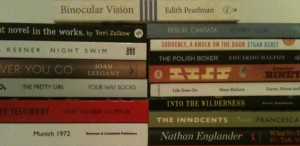Jewish Literary Links for Shabbat

Shabbat shalom.

Shabbat shalom.

Every Friday morning My Machberet presents an assortment of Jewish news, primarily of the literary variety, from around the Web.
Shabbat shalom.
It wasn’t that long ago that I mentioned new courses being offered under the auspices of the Tikvah Fund. I also mentioned that I’d applied for admission to one of those courses.
I’m delighted to share that I have been admitted to the course I applied for: “Zionist Thought and Statesmanship,” taught by Professor Allan Arkush. (I was also tempted by Dara Horn’s “When Bad Things Happen to Good People: Divine Justice and Human Creativity in Jewish Literature,” but that course meets during the day, and I couldn’t swing that with my work schedule.)
If you’re curious, the syllabus for Professor Arkush’s course is online. I can’t wait to get started!
 Last year, I found it useful (and kind of fun) to look back on “my year in Jewish books.” So, borrowing some of the same introductory wording, I’m going to attempt to do something similar for 2012.
Last year, I found it useful (and kind of fun) to look back on “my year in Jewish books.” So, borrowing some of the same introductory wording, I’m going to attempt to do something similar for 2012.
Reviewing my reading for 2012 (thank you, Goodreads!), I can see that I do not and would not ever limit my reading to “Jewish books” exclusively. (By the way, I define “Jewish books” as books with substantive Jewish content/themes. In my view, non-Jewish authors can write “Jewish books.” And Jewish authors can write books that don’t strike me as particularly Jewish. I read several of those books this year, too.)
But this year, as usual, I did read quite a few books that fall within the “Jewish book” category. And, as an advocate for Jewish literature, I’m proud of that.
Below, you will find these books presented in the order in which I read them. (more…)
If you’re reading this before Sunday morning, November 25 (around 9 a.m., Eastern time), you still have time to prepare to catch me on the radio! I’ve been asked to appear on Shalom USA Radio to read my poem, “Questions for the Critics,” and talk a bit about its genesis. I’m looking forward to this opportunity (even if I’m slightly terrified to be broadcasting live). If you want to listen in, you can do so here. Please wish me luck!